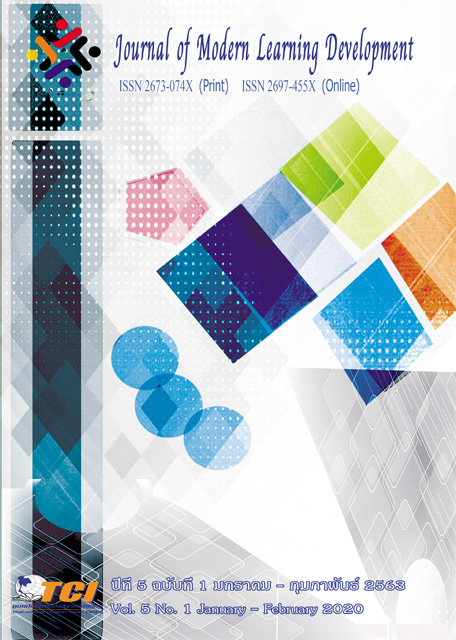A Study Of The Critical Thinking Activities Management To Promote Learning Based On The Threefold Training Principles Of Students At Sarakhampittayakhom School, Mahasarakham Province
Main Article Content
Abstract
The aims of this research were: 1) to study the management of critical thinking activities in accordance with the Tisikkha principles (tisikkhā, the threefold training) to promote learning of students in Sarakhampittayakhom school; 2) to study the problems of the management of critical thinking activities for promoting learning according to the Tisikkha principles of Sarakhampittayakhom school; 3) to study the guidelines for the development of critical thinking activities for promoting learning according to the Tisikkha principles of Sarakhampittayakhom school. This study was carried out by means of both quantitative and qualitative research methodologies with 242 samples. The research instruments included a questionnaire by analyzing the data by using the computer program for social science research to find the following statistics: Frequency, Percentage, Mean, Standard Deviation, t-test and One-Way ANOVA. The qualitative research used its research tool an as interview form. The data were collected from in-depth interviews of 6 key informants. The data was explained in essay form based on the content analysis.
The research results were as follows:
1) The students had opinions on organizing the management of critical thinking activities in accordance with the Tisikkha principles to promote learning of students in Sarakhampittayakhom school, in overall at the high level with the same mean. When considering each aspect, it was found that it was at the highest level in all aspects and in descending order, they are: activities, guidance activities, learning promotion, learning activity management, applying gained knowledge in life, activities for social and public benefits and student activities respectively.
2) The sample group of students with different sex and occupation of parents had indifferent opinions on organizing the management of critical thinking activities in accordance with the Tisikkha principles to promote learning of students in Sarakhampittayakhom school.
3) The guidelines for the development of the management of critical thinking activities in accordance with the Tisikkha principles to promote learning of students in Sarakhampittayakhom school from the interviewees in overall are that the activities should be organized to promote learning skills and abilities for students consistently. In terms of guidance activities, there should be development of guidance activities to cover various areas such as education and career, life in order to prevent and solve problems, encouragement of students to gain knowledge, understanding and skills in critical thinking processes with effective and suitable decisions on various matters for oneself. In terms of student activities, there should be activities for students to fill the curriculum so that students can develop themselves according to their potential including participating in appropriate activities. In the aspect of activities for social and public benefits, there should be activities organized for social and public benefit, focusing on activities that must encourage students to develop themselves naturally and their potential. In the aspect of promoting learning, there should be activities to instill in students to be volunteers that are beneficial to the public until it becomes a habit. In the aspect of learning activities, there should be development of students' learning to be consistent with the age of students, promotion of learning activities about Buddhism by applying various doctrines and principles in learning and teaching activities. In the aspect of applying knowledge in life, there should be development of knowledge, competencies, skills learned or which can be used in daily life, and taking the knowledge, competencies, skills to be practiced to create expertise.
Article Details
References
เกรียงไกร จันทะแจ่ม. (2556). การจัดการเรียนรู้ตามหลักไตรสิกขาในโรงเรียนสัตยาไส จังหวัดลพบุรี. พุทธศาสตรมหาบัณฑิต การบริหารการศึกษา. บัณฑิตวิทยาลัย: มหาวิทยาลัยมหาจุฬาลงกรณราชวิทยาลัย.
ฐานสุขวรรณา วงษ์สุภาพงษ์. (2556). การนำหลักไตรสิกขาไปใช้ในชีวิตประจำวันของนักเรียนชั้นประถมศึกษาปีที่ 4-6 โรงเรียนเทศบาล 1 จังหวัดนครนายก. พุทธศาสตรมหาบัณฑิต. การบริหารการศึกษา. บัณฑิตวิทยาลัย : มหาวิทยาลัยมหาจุฬาลงกรณราชวิทยาลัย.
บุญชม ศรีสะอาด. (2556). วิธีการทางสถิติสำหรับการวิจัย. (พิมพ์ครั้งที่ 5).กรุงเทพมหานคร : สุวีริยาสาส์น.
ปนัดดา ราศรี และ ลัดดา ศิลาน้อย. (2558). การพัฒนาผลสัมฤทธิ์ทางการเรียนและกระบวนการคิดอย่างมีวิจารณญาณของนักเรียนชั้นมัธยมศึกษาปีที่ 2 โดยใช้กระบวนการเผชิญสถานการณ์ ในรายวิชา ส 22101 สังคมศึกษา 3. วารสารศึกษาศาสตร์ ฉบับวิจัยบัณฑิตศึกษา มหาวิทยาลัยขอนแก่น, 9 (1), 63-69.
พระกฤษณะ วชิรญาโณ (วภักดิ์เพชร). (2561). การจัดการเรียนการสอนกลุ่มสาระสังคมศึกษา ศาสนาและวัฒนธรรม ในการส่งเสริมคุณธรรมจริยธรรมแก่นักเรียนมัธยมศึกษาตอนปลายในเขตเทศบาลนครอุดรธานี. พุทธศาสตรมหาบัณฑิต การสอนสังคมศึกษา). บัณฑิตวิทยาลัย : มหาวิทยาลัยมหาจุฬาลงกรณราชวิทยาลัย.
พระมหาทองล้อม สุเมโธ (อินทะสร้อย). (2559). การประยุกต์ใช้หลักไตรสิกขาในการพัฒนาสามเณรนักเรียนต้นแบบของโรงเรียนพุทธโกศัยวิทยา จังหวัดแพร่. พุทธศาสตรมหาบัณฑิต พระพุทธศาสนา. บัณฑิตวิทยาลัย : มหาวิทยาลัยมหาจุฬาลงกรณราชวิทยาลัย.
พระมหาอานนท์ อานนฺโท (ศรีชาติ). (2560). การจัดกิจกรรมการเรียนรู้ตามหลักไตรสิกขาเพื่อพัฒนาผลสัมฤทธิ์ของผู้เรียนสำหรับนักเรียนชั้นมัธยมศึกษาปีที่ 3 โรงเรียนทวีวัฒนา แขวงช่องนนทรี เขตยานนาวา กรุงเทพมหานคร. พุทธศาสตรมหาบัณฑิต การสอนสังคมศึกษา. บัณฑิตวิทยาลัย : มหาวิทยาลัยมหาจุฬาลงกรณราชวิทยาลัย.
วิชิต สงวนไกรพงษ์. (2557). พัฒนาการเรียนรู้ตามหลักไตรสิกขาในพระพุทธศาสนาเถรวาท. พุทธศาสตรดุษฎีบัณฑิต พระพุทธศาสนา. บัณฑิตวิทยาลัย:มหาวิทยาลัยมหาจุฬาลงกรณราชวิทยาลัย.
สำนักส่งเสริมวิชาการและงานทะเบียน.(2552). คู่มือการจัดการเรียนการสอนที่เน้นผู้เรียนเป็นสำคัญ. กรุงเทพมหานคร: มหาวิทยาลัยเทคโนโลยีราชมงคลสุวรรณภูมิ.


